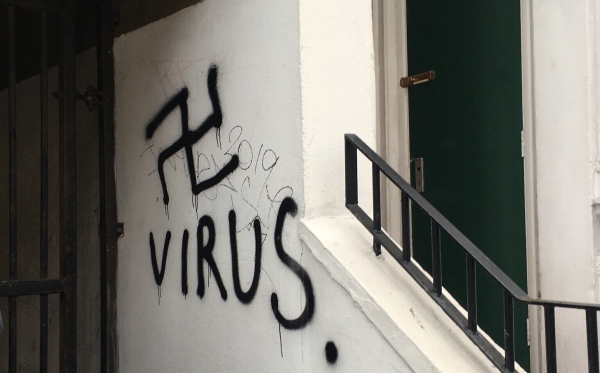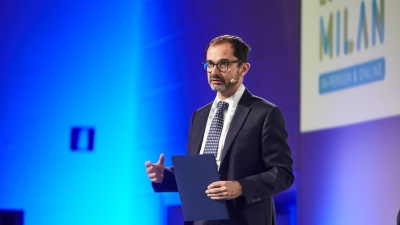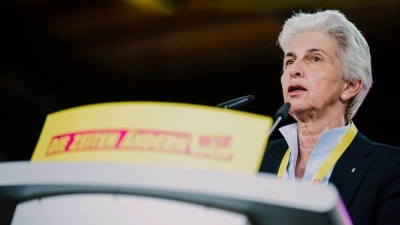Europe can combat antisemitism without weakening free speech

Recently, the French government attempted to implement a blanket ban on all demonstrations in support of Palestine and against Israel’s actions in the Gaza Strip. Other countries in Europe, like Germany, Hungary and the United Kingdom have regretfully followed in France’s footsteps and curtailed the right to free speech and the right to peaceful assembly. Standing up against antisemitism and hate speech is vital, but it should not lead European countries to clamp down on civil rights affecting all citizens.
Since the tragic terror attacks perpetrated by Hamas on 7 October and the brutal siege to which the Israeli Defence Forces have subjected the Gaza Strip, European governments have been divided on how to react to this latest iteration of the Israeli-Palestinian conflict.
EU states are in agreement, however, when it comes to condemning in the strongest terms the attacks by Hamas, which resulted in the deaths of more than 1,400 civilians in cities and kibbutzim in southern Israel. While dysfunctional European foreign policy can do little to impact events in Israel and Gaza, European countries can tackle extremist discourse within their borders.
Hamas is a deeply antisemitic group bent on the destruction of any hint of Jewish life in Israel and Palestine. Most European countries have legal provisions in place limiting or outlawing discourses which glorify terrorism. They are a necessary tool to combat antisemitism (among other hateful ideologies), which is on the rise across Europe – a trend likely to be exacerbated following events in Israel and Palestine.
It is important to avoid conflating Hamas with Palestine, however. The Palestinian push for self-determination long predates Hamas and is not inherently violent. Israel itself insists that its war is with Hamas, not with Palestine – at least on paper. Israel’s advocates and its allies, predominantly in the West, have also made a point of distinguishing between the terrorist group and the struggling Palestinians in Gaza and the West Bank. In the words of French President Emmanuel Macron, Hamas “does not represent the Palestinian people.” Ursula von der Leyen, president of the European Commission, also disassociated Hamas’ abhorrent actions from the Palestinian people, declaring that “what Hamas has done has nothing to do with the legitimate aspirations of the Palestinian people”.
So, clearly, European governments are aware that equating Hamas’s hatred with the Palestinian cause is wrong and deceptive. It is striking, then, that the governments of many European countries are reacting to the fallout from the war by severely restricting pro-Palestinian demonstrations calling for an end to the atrocities in Gaza.
AdvertisementWith the dubious pretext of safeguarding public order, the French government banned all demonstrations in favour of Palestine (though the Conseil d’État, the country’s top administrative tribunal, promptly overturned this sweeping ban). The ban did not just crack down on demonstrations in favour of Hamas or those glorifying terrorism. Supporting Palestine’s right to exist and opposing the brutality in the Gaza Strip was enough for President Macron’s government to drastically curb a crucial civil right, that of peaceful assembly.
France’s neighbour to the east is also considering curbing the right to assembly when it comes to pro-Palestinian rallies. Indeed, many cities in Germany have already banned them. In any case, this did not prevent thousands of citizens from joining rallies in both countries, proving that, justified or not, restrictions on basic rights are seldom easy to enforce effectively.
In the United Kingdom, Home Secretary Suella Braverman (whose anti-Muslim vitriol is well-documented and who has labelled all pro-Palestinian protests as “hate marches”) warned in a letter addressed to British police departments that merely showing or waving a Palestinian flag could constitute a criminal offence. EU institutions also trip up here. A Member of the European Parliament, Manu Pineda, was prohibited from taking the stage in the plenary in Strasbourg on 18 October because he was wearing a kufiyya headdress, a longstanding symbol of the pro-Palestinian movement.
Sadly, there are more instances of freedom of speech and freedom of assembly being targeted by lawmakers and public authorities all over Europe. From football stadiums in Spain to universities in London, it seems public authorities are falling prey to hysteria and grossly overreacting to largely peaceful, legitimate protests. If European governments really understand that Hamas and Palestine are (fortunately) not the same, why are they making it so hard to speak out for the Palestinian people and their human rights?
Those committed to individual freedoms should wholeheartedly defend the right to protest peacefully and to speak freely in Europe, even if we do not agree with many of the ideas and claims being advanced from the pro-Palestinian camp. The fight against hate speech in all its forms (including antisemitism and Islamophobia) cannot become a hurdle against peaceful freedom of expression, especially since both pro-Israeli and pro-Palestinian rallies held since 7 October have been largely peaceful. The Israeli-Palestinian conflict should not lead to a further backsliding on the individual freedoms which are the cornerstones of liberal democracy.
Juan García-Nieto is a research assistant at ESADEGeo and a fellow with Young Voices based in Barcelona, Spain.
Share this article:



